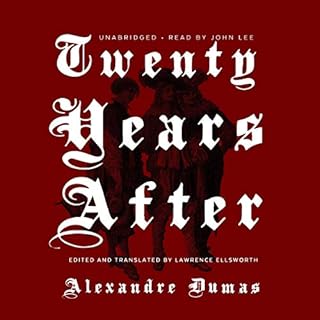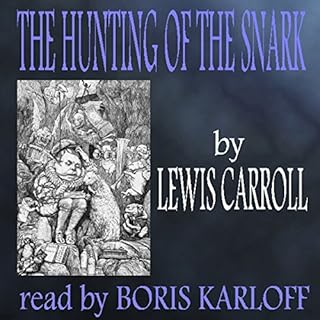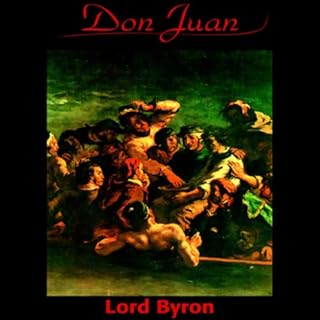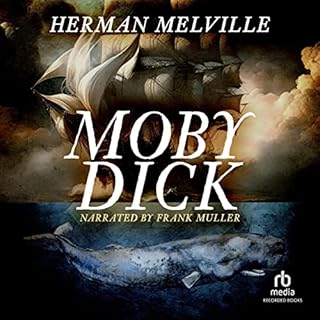Jabba
- 19
- opiniones
- 181
- votos útiles
- 423
- calificaciones
-
The Lady of the Lake
- De: Sir Walter Scott
- Narrado por: Cynthia Moyer
- Duración: 4 h y 34 m
- Versión completa
-
General2.5 out of 5 stars 2
-
Narración:2.5 out of 5 stars 2
-
Historia4 out of 5 stars 2
"The Lady of the Lake" (1810) is a narrative poem set in the vicinity of Loch Katrine, in the Trossach region of Scotland. It is made up of six cantos, each focusing on one day. There’s three main plots to this poem: a competition between three men for the love of one Ellen Douglas, a feud between James Douglas and King James V, and a war between lowland and highland Scots. This poem was incredibly influential at the time of its publication and inspired the Highland Revival movement.
-
3 out of 5 stars
-
A fine narrative poem in an amateur performance
- De Jabba en 01-02-23
- The Lady of the Lake
- De: Sir Walter Scott
- Narrado por: Cynthia Moyer
A fine narrative poem in an amateur performance
Revisado: 01-02-23
The great historical novelist Sir Walter Scott first came to fame as a narrative poet, and I've been waiting for years for some of his poetic works to appear on Audible -- so when I saw this one listed, I snatched it up without hesitation. Alas, it turns out not to be a new recording, but one edited from a public domain LibriVox release -- and, while pretty good by LibriVox standards, it's hardly the work of a capable professional narrator. So I'm still clinging to the hope that Naxos or Ukemi, or somebody, will release a professionally performed audiobook of all Scott's narrative poetry.
Se ha producido un error. Vuelve a intentarlo dentro de unos minutos.
Has calificado esta reseña.
Reportaste esta reseña
esto le resultó útil a 2 personas
-
Don Juan
- De: George Gordon Byron
- Narrado por: Charlton Griffin
- Duración: 15 h y 28 m
- Versión completa
-
General4.5 out of 5 stars 16
-
Narración:4.5 out of 5 stars 14
-
Historia4 out of 5 stars 14
Byron's Don Juan is a comic masterpiece written in a satirical, mock heroic style. Based on the legend of Don Juan, (which is here pronounced JOO-AN), Byron completely reverses the portrayal of Juan, instead showing him as someone easily seduced by women instead of seducing them. He called this form of poetry "epic satire". It is generally considered to be Byron's masterpiece.
-
5 out of 5 stars
-
An Amazing Satirical Journey
- De Anonymous User en 10-09-18
- Don Juan
- De: George Gordon Byron
- Narrado por: Charlton Griffin
I was wrong before. This version is terrific!
Revisado: 12-12-19
I've never objected to the fact that Charlton Griffin always impersonates a British accent; it's that his British persona ALWAYS tends to be so puffed up and high-falutin, and that some of his pronunciations don't seem to be correct for either side of the Atlantic. But in his recent second recording of The Canterbury Tales, he decisively overcame what I saw as his previous limitations, or at least overcame my resistance to them. So I decided to listen to his Don Juan yet again.
I had heard the whole thing when it first came out, and have attempted it two or three times more--Byron's irresistibly witty narrative is very hard for me to stay away from, and no one of the existing recordings is enough to sate my appetite for long. And even on this most recent listen, it took me a few dozen stanzas to really warm up to Griffin's approach. But now I can't believe how much joy I've been missing by not making this my default version of Byron's exuberant and hilarious masterpiece. Thank you, thank you, thank you, Mr. Griffin!
Se ha producido un error. Vuelve a intentarlo dentro de unos minutos.
Has calificado esta reseña.
Reportaste esta reseña
esto le resultó útil a 1 persona
-
Twenty Years After
- De: Alexandre Dumas
- Narrado por: John Lee
- Duración: 13 h y 19 m
- Versión completa
-
General4.5 out of 5 stars 157
-
Narración:5 out of 5 stars 137
-
Historia4.5 out of 5 stars 135
When Twenty Years After opens it is 1648: the Red Sphinx, Cardinal Richelieu, is dead, France is ruled by a regency in the grip of civil war, and across the English Channel the monarchy of King Charles I hangs by a thread. As d’Artagnan will find, these are problems that can’t be solved with a sword thrust. In Twenty Years After, the musketeers confront maturity and face its greatest challenge: sometimes, you fail. It’s in how the four comrades respond to failure, and rise above it, that we begin to see the true characters of Dumas’s great heroes.
-
2 out of 5 stars
-
Unabridged, except that half is left out
- De Jabba en 10-04-19
- Twenty Years After
- De: Alexandre Dumas
- Narrado por: John Lee
Unabridged, except that half is left out
Revisado: 10-04-19
If this were sold as Twenty Years After, Part One of Two, it would deserve high marks. But it's sold as Twenty Years After, Unabridged, EVEN THOUGH IT'S ONLY HALF THE BOOK. So I've cut my Overall and Story ratings in half as well. For what it is, it's a worthy undertaking, but it's NOT an unabridged recording of Dumas' novel. (The remainder is to appear later, under a different title, presumably in order to make it harder for audiences to follow up on. Shrewd marketing all around.)
Don't get me wrong. As Part One of Two, this partial version is worth purchasing, and I look forward to the follow-up. There are plenty of series books in which the reader is left hanging at the end of individual installments, after all, so the mere fact that Twenty Years After has been split in two doesn't provoke that much indignation. But that it has been split in two should be ANNOUNCED on the cover and in the product listing. To release *half* of a famous novel as if it were the *entire* novel is just inexcusable.
ADDENDUM (December 2020): Part Two of this translation has, at length, been released ... not as Twenty Years After, Part Two, which might have most readily helped potential purchasers who had been searching for the complete story, nor even as The Son of Milady, the title readers and listeners of this first volume have been alerted to watch out for, but as BLOOD ROYAL. Should be worth a listen, but what a way to do business!
Se ha producido un error. Vuelve a intentarlo dentro de unos minutos.
Has calificado esta reseña.
Reportaste esta reseña
esto le resultó útil a 41 personas
-
The Hunting of the Snark
- De: Lewis Carroll
- Narrado por: Boris Karloff
- Duración: 22 m
- Versión completa
-
General4.5 out of 5 stars 39
-
Narración:4.5 out of 5 stars 34
-
Historia4.5 out of 5 stars 34
But what is a Snark? "Humpty Dumpty's theory, of two meanings packed into one word like a portmanteau, seems to me the right explanation for all." (Lewis Carroll)
-
4 out of 5 stars
-
Savory & Strange--but Missing a Fit!!!
- De Jefferson en 10-17-10
- The Hunting of the Snark
- De: Lewis Carroll
- Narrado por: Boris Karloff
Missing the final words of the recording!
Revisado: 01-04-17
Carroll's poem is wonderful, Karloff's performance unsurpassable (even though abridged to fit on one side of an LP). But, here on Audible, the end of the poem's final sentence has been completely lopped off! Look for Karloff's "complete" (albeit abridged) recording elsewhere.
Se ha producido un error. Vuelve a intentarlo dentro de unos minutos.
Has calificado esta reseña.
Reportaste esta reseña
esto le resultó útil a 1 persona
-
The Adventures of Sam Spade, Detective: Volumes One & Two
- De: Dashiell Hammett
- Narrado por: Howard Duff, Steve Dunne
- Duración: 5 h y 42 m
- Grabación Original
-
General4.5 out of 5 stars 112
-
Narración:4.5 out of 5 stars 93
-
Historia4.5 out of 5 stars 92
Steely. Seasoned. Smart-alecky. The storied San Francisco snooper is back! Share the exciting exploits of Dashiell Hammett's famous gumshoe through this thrilling 6-hour collection. Featuring all of the episodes from both our Volume One and Volume Two collections, Howard Duff and Steve Dunne star as Sam Spade in 12 madcap capers from 1946 - 1951. As crass as he is charismatic, this dynamic detective attracts a curious clientele - gentlemen who tend to drop dead and ladies who are drop-dead gorgeous.
-
4 out of 5 stars
-
Bring Back Howard Duff
- De Jean G. Zorn en 06-14-14
Lots of fun with Duff and Dunne
Revisado: 08-31-16
Steve Dunne is no Howard Duff, but that doesn't mean he's no good at all. Save the Howard Duff episodes for last, but most of the Dunne episodes are lots of fun, too, with the always-superb Lurene Tuttle outdoing her splendid self to help take up Dunne's slack.
Se ha producido un error. Vuelve a intentarlo dentro de unos minutos.
Has calificado esta reseña.
Reportaste esta reseña
esto le resultó útil a 1 persona
-
Don Juan
- De: Lord Byron
- Narrado por: Jonathan Keeble
- Duración: 15 h y 18 m
- Versión completa
-
General4.5 out of 5 stars 58
-
Narración:4.5 out of 5 stars 53
-
Historia4.5 out of 5 stars 54
Lord Byron's satirical take on the legend of Don Juan is a moving and witty poem that sees the young hero in a reversal of roles. Juan sheds his image as a womanizer and instead becomes the victim of circumstance as he is relentlessly pursued by every woman he meets. Comprising 17 cantos of rhyming iambic pentameter, the poem is a crisp and accessible meditation on the madness of the world.
-
4 out of 5 stars
-
The Impertinence of Being Earnest
- De Jabba en 03-20-16
- Don Juan
- De: Lord Byron
- Narrado por: Jonathan Keeble
The Impertinence of Being Earnest
Revisado: 03-20-16
In some ways, Jonathan Keeble's new recording of Byron's "Don Juan" is far and away the best on Audible, being quite free from such impediments of timbre, mannerism, and affectation as detract from the earlier versions by Robert Bethune, Frederick Davidson, and Charlton Griffin. Keeble is a superbly accomplished narrator, in complete command of his vocal instrument and of the tonal effects he wants to achieve with it in every passage, line, pause, and syllable. He knows (or thinks he knows) what complex of effects Byron aims at in every moment of the text, calculates every nuance of his performance accordingly, and realizes those effects with pinpoint accuracy.
Just one problem: his notion of the effects Byron is trying to achieve is spectacularly wrong-headed.
It's true, of course, that Byron employs a rich palette of tones over the more-than-sixteen-canto span of his masterpiece. But the keynote tone of the whole is this: the poem is funny. Setting aside the humorous parts of "The Canterbury Tales," it is unquestionably the outstanding comic poem in English. Its satire may sometimes drip with sneering disdain or thunder with prophetic wrath (Keeble does these very well), but mostly it is undisguised, exuberant, sophisticated wit that finds the poet insouciantly skewering innumerable puffed-up solemnities we can hardly believe anyone has ever taken seriously.
Yet Keeble seems unaware of this. One might think he supposed himself to be narrating, not the ribald misadventures of Don Juan, but the solemn mopings and meanderings of Childe Harold. The keynote tone of this audiobook is stern, solemn, grim, with only faint shadows of lightness of touch. Sometimes, as in the shipwreck episode, this approach is perfectly correct. But most often, Keeble's earnest tone is simply not pertinent to the jaunty self-projection of Byron's stinging barbs, and it is impertinent, too, therefore, in that it disrespects the sustained and scintillating levity that Byron so deliciously achieved.
Given all this, a rating for this book is hard to settle on. On its own terms, I must admit, it is magnificently done, and I did enjoy listening to it, but in a quite different way than I enjoyed Bethune despite his pinched nasality, Davidson despite his cloying preciousness, and Griffin despite his elaborately assumed pseudo-British persona. If those other versions manage to capture the poet's comic achievement only imperfectly, Keeble's stands in one way as definitive--but definitive for a Bizarro world in which Byron's work is predominantly a triumph of straightfaced gravity rather than vivacity of wit. Should you spend a credit on it? After listening to the samples, I guess you pays your money and you takes your choice. But for a notion of how "Don Juan" ought to be done, listen to the free online recordings of selected cantos by Peter Gallagher. In the meantime, despite Keeble's narratorial virtuosity, I think your best bet is Charlton Griffin.
Se ha producido un error. Vuelve a intentarlo dentro de unos minutos.
Has calificado esta reseña.
Reportaste esta reseña
esto le resultó útil a 25 personas
-
The Faerie Queene
- De: Edmund Spenser
- Narrado por: David Timson
- Duración: 33 h y 10 m
- Versión completa
-
General4.5 out of 5 stars 89
-
Narración:5 out of 5 stars 77
-
Historia4.5 out of 5 stars 76
This remarkable poem, dedicated to Queen Elizabeth I, was Spenser's finest achievement. The first epic poem in modern English, The Faerie Queene combines dramatic narratives of chivalrous adventure with exquisite and picturesque episodes of pageantry. At the same time, Spenser is expounding a deeply-felt allegory of the eternal struggle between Truth and Error....
-
5 out of 5 stars
-
High Fantasy from the Renaissance
- De Jabba en 10-03-15
- The Faerie Queene
- De: Edmund Spenser
- Narrado por: David Timson
High Fantasy from the Renaissance
Revisado: 10-03-15
In twelfth-century France, Chrétien de Troyes produced the first-ever cycle of chivalric romances, recounting in glistening octosyllabic couplets the exploits of six knights of King Arthur's Round Table. Four centuries later, in England and Ireland, Edmund Spenser produced a much more elaborate cycle of six romances in much more elaborate verse, expanding on and complicating Chrétien's legacy under the inspiration of both more ancient and more recent epic and romance traditions.
In most Arthurian romances, for example, the noblest monarch in the world is King Arthur, and the greatest knight is Lancelot, who tragically falls in love with Arthur's queen. In the Spanish prose romance "Amadis of Gaul," on the other hand, the noblest monarch is King Lisuarte, and the greatest knight is Amadis, who has the good fortune to fall in love not with Lisuarte's queen, but with his unmarried daughter, the Princess Oriana. Spenser takes this trend a bold step further: in his vast poetic fantasy, the noblest monarch is the Queen of Faerie, and the greatest knight is the young Prince Arthur, not yet king of Britain, who falls in love with that same unmarried Queen, the tantalizing Gloriana. In fact, it is Gloriana who takes the initiative by making herself known to Arthur and declaring her love for him, but then vanishes, leaving him to seek her out in a world of pathless forests.
In the suite of romances known as "The Faerie Queene," then, Spenser is creating an enormous alternate-history prequel to the Arthurian romances we already know: nearly a quarter of a million words of loosely intertwined adventures featuring (for the most part) an altogether new cast of amorous knights and ladies, new champions who must quest for true love and virtue while combating miscreants, monsters, wizards, and witches in a land drenched with symbolism and enchantment. (The fact that everything is symbolic is part of the enchantment.) In working out those adventures, he draws freely not only on Arthurian tradition but on Renaissance Europe's most sensationally successful modern epics, those of the Italian masters Boiardo and Ariosto, whose panoramic narrative tapestries centering on the paladins of Charlemagne constitute together far and away the vastest and most imaginative work of epic fantasy in the Western world until Tolkien, at least. But it is no less true that Spenser aims to do for England and the British Isles what Homer and Virgil and Ovid had done for ancient Greece and Rome: his poem also aspires to mimic the great classical epics, and if its protagonists are not quite as apt to recall Odysseus or Aeneas as Lancelot or Gawain, they are at least no more likely to encounter a guardian angel than an Olympian goddess.
In such unabashed intermingling of ordinarily disparate fantasy realms and genres, "The Faerie Queene" was a major influence on C. S. Lewis in the Chronicles of Narnia; and, long before that, its trailblazing splendor of ancient, medieval, and modern learning, penetrating moral insight, vividly sensuous imagination, unexampled metrical fluency, and rapturous prosodic mastery had served as both incitement and inspiration to nearly every other poet of the English Renaissance, including Shakespeare, and to many others in the centuries that followed.
The challenge posed to any would-be narrator by both the nature and the stature of such a work is formidable, but luckily the supremely accomplished David Timson was willing to take up the gauntlet. True, Timson is not able to inhabit the author and his characters as fully as in his readings of Sherlock Holmes stories or Dickens novels. There is simply not much spoken dialogue in "The Faerie Queene" for a gifted character actor to latch onto, and not much that lends itself to a novelistic approach to oral narration. Spenser's is an older manner of romance: remote, exotic, stylized. A brisk willingness to wax rhapsodic even at the risk of sounding hokey may be the best way to engage such high-flown material; Timson has done that brilliantly in the Naxos "Poems of the Orient" collection, and so of course proves more than capable of warming up to what Spenser is doing here as well. His performance never falls short of eloquence, and when the wheels of his spoken narration fully engage the thematic and emotive gears driving Spenser's narrative, they achieve a remarkable forward impetus. For the most part, Timson brilliantly captures the gripping incantatory pulse of Spenser's lines and stanzas as they weave their stirring, brooding, or exhilarating spell of power.
At other times, I admit, he may seem to be treating "The Faerie Queene" as if it were no more than a juvenile fantasy novel. But don't get me wrong: even in non-epic modes, Timson manages some astonishing feats. In fact, given that Spenser is a pre-Enlightenment poet and romancer rather than a pioneering novelist, it is amazing how much novelistic immediacy Timson is able to wring for us from his ringing cantos. When the poet tells us how the haughty Queen Lucifera lords it over her subjects and distinguished visitors, we now, thanks to Timson's performance, hear this as the projected narration she is listening to in her own head, as if she were imagining a herald's voice proclaiming her magnificence. And Timson is not freelancing here, not going rogue; he is foregrounding something that we can now see was always there. Forget what I said before: the supposedly remote, exotic, stylized Spenser, like one of the great classic novelists who follow him, is letting what seemed to be impersonal omniscient narration shade into direct, intimate, vivid expression of a character's mind.
Still, novelistic and dramatic methods are generally not the most salient means by which Spenser seeks to galvanize our insight and enjoyment, and in singling out the merits of this recording it would be wrong to overemphasize them. In particular, it must be said that Timson's repertoire of vocal characterizations, so expertly deployed to render the denizens of Doyle's or Dickens' London, sometimes seems less suited to the knights and ladies of Spenser's Faerie Land, with the result that what is by rights an epoch-making masterpiece occasionally seems no more than an idiosyncratic minor classic. That's too bad; but Timson's exuberantly vigorous narration, strictly as such, is for the most part so dazzling as to make the unabridged Naxos "Faerie Queene" beyond question a five-star listening experience. So let me repurpose here something I've said elsewhere: If you have any interest at all in English literature, epic poetry, medieval romance, Renaissance opulence, the headwaters of British Romanticism, or even today's high fantasy adventure fiction, David Timson's performance of "The Faerie Queene" is something you won't want to miss. For the most part, Timson, like Spenser himself, is simply amazing.
[Revised September 2020]
Note: As of March 2022, I was delighted to see that this title is being offered as a Whispersync companion to the excellent Penguin Classics Kindle edition of "The Faerie Queene" by Thomas P. Roche, Jr. The Kindle books previously selected for such pairing have not been complete, but the Penguin edition faithfully includes not only the fragmentary Book VII (the Mutabilitie Cantos) but also the poet's explanatory letter to Sir Walter Raleigh, which together account for a good 70 minutes of Timson's narration. (It also includes ample material not included in the audio version: the Dedicatory Sonnets addressed by the poet to Raleigh and other dignitaries; the Commendatory Verses addressed to the poet by Raleigh and other well-wishers; copious but not excessive explanatory endnotes provided by the editor; and, in the recent reissue, an active Table of Contents that can take you to any of the work's 74 cantos individually rather than merely the six or seven books that contain them.) So, while you may still find a cheaper Whispersync companion for "The Faerie Queene" in the Kindle store, the Penguin is the one that's worth your money. If you want to be able to read along, or switch between listening and reading, for the entire length of the poem, the Penguin is the one you need -- and you need to shop carefully, because many an incomplete "bargain" edition masquerades behind a cover design or even an Amazon product listing that may lead you to think you're getting the Penguin "Faerie Queene" when you're not. Check the Kindle sample before clicking on Buy Now.
Se ha producido un error. Vuelve a intentarlo dentro de unos minutos.
Has calificado esta reseña.
Reportaste esta reseña
esto le resultó útil a 52 personas
-
Don Juan
- De: Lord Byron
- Narrado por: Frederick Davidson
- Duración: 15 h
- Versión completa
-
General3.5 out of 5 stars 60
-
Narración:4 out of 5 stars 32
-
Historia4 out of 5 stars 32
Byron's exuberant masterpiece tells of the adventures of Don Juan, a handsome and charming young man naturally gifted with the ladies. After his first illicit love affair at the age of 16 in his native Spain, he is exiled to Italy. Following a dramatic shipwreck, his exploits take him to Greece, where he is sold as a slave, and to Russia, where he becomes a favorite of the Empress Catherine, who sends him on to England.
-
4 out of 5 stars
-
Glad to have it
- De George en 02-10-07
- Don Juan
- De: Lord Byron
- Narrado por: Frederick Davidson
One of the two best versions on Audible
Revisado: 07-16-15
Looking for an audiobook of Byron's comic epic masterpiece? Try listening online to Peter Gallagher's wonderful free performance of five selected cantos and you'll wonder why Audible hasn't commissioned him to do the entire poem. Until then, Michael Sheen's reading of a 22-minute selection from Canto One on the "Great Poets of the Romantic Age" anthology is not to be missed (but what uncredited actress so splendidly takes on the women's parts?). And Tyrone Power's similar selection is certainly worthwhile. But if you want to listen to the whole shimmering shebang, you could do worse than Frederick Davidson. Davidson somehow does not know how Byron pronounces "Juan," and for some reason reads the stanza numbers out loud, but his impersonation of Byron's *narrator* seems to me the best full-length interpretation on Audible. Your other choices are Robert Bethune, who has heroically recorded ALL of Byron's poetry for us, but has has even less understanding of how Byron pronounces "Juan"; Jonathan Keeble, a supremely accomplished performer who somehow (to my ears, but not everyone's) misses the lion's share of Byron's humor; and Charlton Griffin, whose usually over-inflated mannerisms I tend to find off-putting, but who has finally won me over as (so far) the best-ever performer of the entire poem.
Se ha producido un error. Vuelve a intentarlo dentro de unos minutos.
Has calificado esta reseña.
Reportaste esta reseña
esto le resultó útil a 5 personas
-
The White Company
- De: Arthur Conan Doyle
- Narrado por: Nick Rawlinson
- Duración: 15 h y 31 m
- Versión completa
-
General4.5 out of 5 stars 243
-
Narración:4.5 out of 5 stars 215
-
Historia4.5 out of 5 stars 216
The White Company is a motley group of English mercenaries, fighting under the leadership of Sir Nigel Loring. Bound by an unquestioning respect for social order, patriotism and a lust for adventure, the company makes its way to France to fight in the local wars. With assiduous attention to historical detail, Conan Doyle paints a convincing picture of the chivalric life and manners of the 14th century.
-
4 out of 5 stars
-
Chivalric High Jinks, by My Ten Finger Bones!
- De Jefferson en 08-09-11
- The White Company
- De: Arthur Conan Doyle
- Narrado por: Nick Rawlinson
Vivifying performance of an overrated juvenile
Revisado: 06-09-15
A young-adult historical adventure novel that I might have enjoyed more if I'd first read it as a kid. As it was, I found it acceptable but only rarely gripping or absorbing; what held my attention was the vital and versatile performance by Nick Rawlinson, whose virtuoso rendering of innumerable regional and national accents, distinctively individual voice characterizations, and zestfully-paced storytelling convincingly galvanize what for me would have been a semi-moribund, strictly juvenile classic.
Se ha producido un error. Vuelve a intentarlo dentro de unos minutos.
Has calificado esta reseña.
Reportaste esta reseña
esto le resultó útil a 6 personas
-
Moby-Dick
- De: Herman Melville
- Narrado por: Frank Muller
- Duración: 21 h y 11 m
- Versión completa
-
General4 out of 5 stars 6,456
-
Narración:4.5 out of 5 stars 5,537
-
Historia4 out of 5 stars 5,548
Labeled variously a realistic story of whaling, a romance of unusual adventure and eccentric characters, a symbolic allegory, and a drama of heroic conflict, Moby Dick is first and foremost a great story. It has both the humor and poignancy of a simple sea ballad, as well as the depth and universality of a grand odyssey.
-
5 out of 5 stars
-
I Had No Idea Melville Was So Funny
- De Dave en 05-09-12
- Moby-Dick
- De: Herman Melville
- Narrado por: Frank Muller
A trial and a triumph
Revisado: 05-25-15
I must admit that I found Melville's leviathan of a masterpiece to be almost as much a trial as it is a triumph; the "documentary" material on whales and whaling is just vastly out of proportion to what is necessary to tell the story or add vividness and color. Frank Muller's narration, however, never flags in those qualities: vividness, color, urgency, and eloquence are its essence. I've never heard better narration of a classic.
Se ha producido un error. Vuelve a intentarlo dentro de unos minutos.
Has calificado esta reseña.
Reportaste esta reseña
esto le resultó útil a 1 persona










